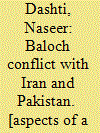| Srl | Item |
| 1 |
ID:
188598


|
|
|
|
|
| Publication |
North America, Trofford Publishers, 2017.
|
| Description |
xii, 342p.pbk
|
| Standard Number |
9781490780917
|
|
|
|
|
|
|
|
|
|
|
|
Copies: C:1/I:0,R:0,Q:0
Circulation
| Accession# | Call# | Current Location | Status | Policy | Location |
| 060279 | 954.54915/DAS 060279 | Main | On Shelf | General | |
|
|
|
|
| 2 |
ID:
001019


|
|
|
|
|
| Publication |
London, I B Tauris, 1998.
|
| Description |
xiv, 434p.hbk
|
| Standard Number |
1860642586
|
|
|
|
|
|
|
|
|
|
|
|
Copies: C:1/I:0,R:0,Q:0
Circulation
| Accession# | Call# | Current Location | Status | Policy | Location |
| 040540 | 955.052/GHA 040540 | Main | On Shelf | General | |
|
|
|
|
| 3 |
ID:
132106


|
|
|
|
|
| Publication |
2014.
|
| Summary/Abstract |
The major foreign concessions granted in the reign of Nasser al-Din Shah Qajar have received considerable attention, none more so than the Tobacco Rebellion, which is generally viewed as a watershed event in the awakening of political consciousness in Iran. Although mentioned in most of the published material on the precedents of the Constitutional Revolution of 1906, a revised narrative of the tobacco rebellion is overdue. This paper fills the gaps and revises some of the widely held assumptions on the forces that unleashed a nationwide movement that almost brought down the Qajar dynasty. The emphasis is on the incendiary protests in Tabriz and the largely neglected role of Hajj Kazem Malek-al-Tojjar. This article, which is the fifth of a series by the author on the two Malek-al-tojjar-e mamalek-e mahrusa of the Qajar era, questions the authorship of the fatwa (hokm) and re-assesses the motivation for its hasty proclamation and dissemination. In other words, were the "sensation-seekers" the heroes of reform or is there a neglected version to extricate from the truths and half-truths propounded about this watershed event?
|
|
|
|
|
|
|
|
|
|
|
|
|
|
|
|